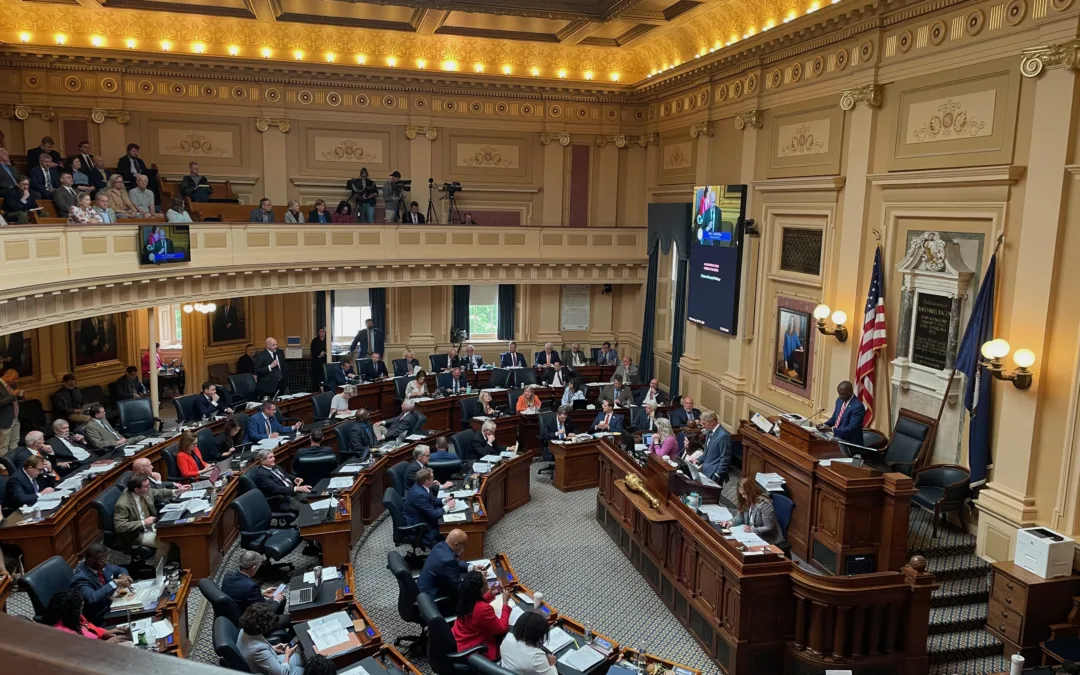
On Jan. 24, Virginia House Republicans passed Gov. Glenn Youngkin’s $1 billion tax cut program, a plan that not only benefits large corporations and the wealthy, but simultaneously makes it so small businesses and Virginia residents will owe more. The proposal now faces an uphill battle in the state Senate.
Specifically, the House passed the individual income tax measures, a cut in corporate income taxes, and a deduction targeted at small businesses. The Republican-led House of Delegates and Gov. Youngkin are both pushing to cut taxes, but Democrats in the Senate say that the money is needed to “make up for roughly 15 years of underfunded schools and other vital public services.”
Youngkin’s tax relief program calls for cutting the top rate for individual income taxes from 5.75% to 5.5%. The program would also lower the Virginia corporate tax rate to 5%, which is lower than the 5.75% tax rate that most Virginia families pay currently, and still lower than it would be should the proposed 5.5% go through. Some of the corporations that could benefit from the cut aren’t even located in Virginia. Big corporations will also get more than double the tax breaks given to small businesses under the plan.
Lowering the top tax rate from 5.75% to 5.5% also gives the most benefit to top earners, as four out of every five of the dollars included in the over $900 million plan will go towards cutting that top tax rate, which means most of the cut will go towards making the rich richer.
Youngkin’s plan also calls for raising the standard deduction from $8,000 to $9,000 for those who file alone and from $16,000 to $18,000 for joint returns.
“I always say: don’t tell me your priorities. Show me your budget and I’ll tell you your priorities,” Democratic Del. Don Scott said in a statement. “The Republican tax bill is a giveaway to corporations – which will either mean tax hikes for families or deep cuts to services. The Democratic tax bill gives cuts to families and provides immediate relief to people feeling soaring costs. That’s because Democrats prioritize families, and Republicans prioritize corporations and the wealthy.”
As Republican Sen. Tommy Norment, former co-chair of the Senate Finance Committee, told The Richmond Times-Dispatch, it’s a bit too early to say exactly what changes will be made to the proposed budget amendments, as the exact numbers are usually worked out in conference committee since the House and Senate tend to come up with significantly different proposals. Amendments to the budget show the extent of the differences between Democrats and Youngkin, however.
Virginia Democrats say that the state has other needs the $1 billion surplus should be used for, such as school construction work and state school staffing standards, which, as Democratic Del. Sally Hudson said during a debate on corporate tax cuts, have not been fully funded since the Great Recession.
Democratic Sens. Jennifer McClellan and Jeremy McPike are both proposing a $2.5 billion appropriation for state grants to local school boards to help fund school construction. They’re also proposing $379 million to fully cover the state’s promised share of costs of staffing and other state-set requirements for K-12 schools under Virginia’s Standards of Quality revisions. Democratic Sen. Aaron Rouse is also looking for an additional $274 million to cover the state’s part of a 10% increase in teacher salaries.
McClellan also has an amendment that focuses on affordable housing for Virginia families, and has proposed a $90.1 million fund to provide rental vouchers for households with incomes below local medians. Democratic State Sen. Mamie Locke has proposed a slightly larger $91 million appropriation, and Democratic Sen. Dave Marsden wants to add $75 million to the Virginia Housing Trust Fund, which helps with financing for affordable housing units.
In addition to the above items, Virginia Democrats also want to focus state spending on mental health and support for people with developmental and intellectual disabilities, as well as increases in Medicaid payments to a wide range of providers.
Sometime between now and the end of 2023’s legislative session, Senate Democrats will weigh in on the governor’s proposed tax plan. What a final plan will look like remains to be seen.
Politics

Youngkin, Democrats to start over on budget talks
The Republican governor stood with Democratic leaders in the General Assembly on Wednesday in a bid to ease tensions over their budget debate....

VIDEO: Domestic abuse victims speak out against the gun law bills Gov. Glenn Youngkin vetoed
Senate Bill 47 and House Bill 46 aim to close the loophole that allows offenders to transfer their firearms to someone else instead of relinquishing...
Local News

Virginia verses: Celebrating 5 poetic icons for National Poetry Month
There’s no shortage of great writers when it comes to our commonwealth. From the haunting verses of Edgar Allan Poe, who found solace in Richmond's...

Join the fun: Recapping Family Literacy Night’s storybook adventures
When’s the last time you read a book aloud with a loved one? If it’s difficult to answer that question, then maybe it’s time to dust off that TBR...



